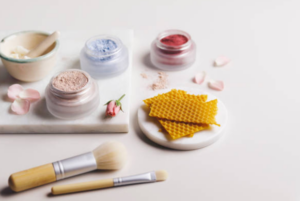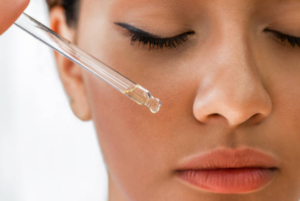Collagen, Keratin, and Beyond

In the ever-expanding realm of beauty products, the quest for flawless skin often involves an intricate dance with ingredients. As consumers become more conscientious about the products they use, the spotlight has turned towards the inclusion of animal-derived ingredients in makeup. In this exploration, we’ll delve into the world of collagen, keratin, and other animal-derived elements, examining their origins, ethical considerations, and alternatives for a more informed beauty regimen.
As we embark on the quest for radiant skin, the intricate dance with ingredients unfolds. From serums promising eternal youth to lipsticks that boast vibrant hues, the beauty industry caters to a spectrum of desires. Yet, as our beauty routines become more sophisticated, so does our curiosity about the origins of the ingredients we apply daily.
Beyond the realm of plant extracts and laboratory innovations, a closer look reveals the inclusion of animal-derived elements in many beauty formulations. Collagen, revered for its skin-plumping prowess, and keratin, the structural foundation of our hair and nails, have become staples. However, as the beauty consumer becomes more conscious, questions about ethics, sustainability, and the treatment of animals have begun to resonate louder than ever before.
Collagen: Beauty’s Structural Marvel
What is Collagen? Collagen, the most abundant protein in the human body, plays a vital role in maintaining skin elasticity and hydration. It’s no wonder that the beauty industry has embraced collagen as a go-to ingredient, promising to restore youthfulness and suppleness to the skin.
Origins of Collagen in Makeup: Traditionally, collagen in cosmetics has been sourced from animal by-products, often derived from bovine (cow) or piscine (fish) origins. Bovine collagen is extracted from the skin and bones of cows, while piscine collagen comes from fish scales and skin.
Ethical Considerations: Despite its beauty-enhancing properties, the use of animal-derived collagen raises ethical concerns. The beauty industry’s demand for collagen has led to questions about sustainable practices, animal welfare, and environmental impact.
Cruelty-Free Alternatives: For those seeking to avoid animal-derived collagen, the market now offers a variety of cruelty-free alternatives. Plant-based collagen boosters, such as extracts from algae, soy, and other botanical sources, are gaining popularity. These alternatives not only cater to ethical concerns but also often boast additional benefits like antioxidant properties.
Keratin: Hair’s Protein in Makeup
Understanding Keratin: Keratin, a protein found in hair, nails, and the outer layer of the skin, is another key player in the beauty industry. It provides structure and strength to these tissues, making it a sought-after ingredient for hair care and nail products.
Animal Origins of Keratin: Similar to collagen, traditional sources of keratin in cosmetics include animal-derived ingredients. Hooves, horns, and feathers are processed to extract keratin for use in various beauty formulations.
Ethical Dilemmas: The extraction of keratin from animals has ethical implications, raising questions about the treatment of animals and the environmental impact of sourcing such ingredients. As consumers become more conscious, the beauty industry is witnessing a shift towards cruelty-free and vegan alternatives.
Vegan-Friendly Options: In response to the demand for ethical alternatives, many brands now offer vegan-friendly keratin substitutes. Plant-based sources, including wheat, soy, and corn proteins, have proven effective in providing the desired strengthening and conditioning effects without the need for animal-derived ingredients.

Navigating Other Animal-Derived Ingredients
- Beeswax: Nature’s Sealant
Understanding Beeswax: Beeswax, a natural emollient, has been a cornerstone in cosmetic formulations for its moisturizing and protective properties. Harvested from beehives, beeswax acts as a barrier on the skin, preventing moisture loss and providing a smooth texture in various beauty products.
Ethical Dilemmas: While beeswax has been a go-to ingredient, ethical concerns arise concerning its sustainability and the potential impact on bee populations. The increased demand for beeswax in cosmetics prompts reflection on responsible sourcing practices.
Cruelty-Free Alternatives: To address ethical concerns, a shift towards cruelty-free alternatives is gaining momentum. Plant-based waxes, such as candelilla wax derived from the leaves of the candelilla shrub, and carnauba wax extracted from the leaves of the carnauba palm, offer similar emollient properties without relying on bee exploitation.
- Carmine: The Color of Crushed Insects
Understanding Carmine: Carmine, a vivid red pigment, has been a staple in lipsticks, blushes, and eyeshadows for centuries. Its origin, however, is less glamorous – extracted from crushed cochineal insects native to South America. The vibrant hue obtained from these tiny insects has long been prized in the cosmetic industry.
Ethical Considerations: The use of insects in cosmetic formulations raises ethical concerns as the extraction process involves killing large numbers of cochineal insects. The impact on biodiversity and the treatment of these creatures have spurred a growing desire for cruelty-free alternatives.
Plant-Based Pigments: In response to ethical considerations, many beauty brands are turning to plant-based pigments to achieve vibrant colors. Ingredients like beetroot, berries, and other botanical sources offer a cruelty-free and vegan-friendly alternative to carmine, providing a diverse palette without compromising on color intensity.
- Squalene from Shark Liver
Understanding Squalene: Squalene, valued for its moisturizing properties, has traditionally been sourced from shark liver. The beauty industry’s reliance on this animal-derived ingredient raises concerns about the sustainability of shark populations and the environmental impact of extraction.
Cruelty-Free Alternatives: Acknowledging the ecological impact, cruelty-free alternatives to shark-derived squalene have gained prominence. Plant-derived squalane, often sourced from olives and sugarcane, provides a sustainable and cruelty-free option, offering the same hydrating benefits without contributing to the decline of shark populations.
- Lanolin: Nature’s Moisturizer
Understanding Lanolin: Lanolin, derived from sheep’s wool, has been a cherished ingredient in skincare for its moisturizing properties. Rich in fatty acids, lanolin is often used in lip balms, creams, and lotions to hydrate and soothe the skin.
Ethical Implications: The extraction of lanolin involves the collection of wool grease from sheep, raising concerns about animal welfare and ethical practices in the wool industry.
Vegan Alternatives: For those seeking cruelty-free alternatives, plant-based substitutes like shea butter, cocoa butter, and plant-derived oils offer similar moisturizing benefits without the ethical concerns associated with lanolin.

A Guide to Ethical Beauty Consumption
- Label Scrutiny: Decoding the Beauty AlphabetDive into the world of ingredient lists on your beauty products. Recognizing animal-derived components may require a bit of decoding, but it’s an essential step in making informed choices. Ingredients like collagen, keratin, carmine, and beeswax often signal animal origins. Moreover, look for cruelty-free certifications or logos such as Leaping Bunny or PETA’s Beauty Without Bunnies to identify products aligned with ethical practices.
- Educate Yourself: Knowledge is GlamorousStay abreast of the ethical implications associated with beauty ingredients. Online resources, cruelty-free beauty blogs, and apps dedicated to decoding product labels are invaluable tools. Understanding the origins and ethical considerations of various ingredients empowers you to make choices that align with your values.
- Support Ethical Brands: Dollars Speak Louder Than WordsYour purchasing power is a potent tool for change. Choose to support brands that openly embrace cruelty-free and vegan formulations. Many ethical beauty brands are transparent about their practices, sourcing, and sustainability efforts. By investing in products from these brands, you not only enhance your beauty routine but also contribute to a demand for ethical alternatives.
- DIY Beauty: Becoming the AlchemistFor the adventurous beauty enthusiasts, experimenting with DIY beauty recipes can be a rewarding experience. Crafting your skincare and makeup products gives you control over the ingredients, ensuring that your beauty routine is in harmony with your ethical values. Ingredients like coconut oil, shea butter, and essential oils can be blended to create personalized, cruelty-free formulations.
- Advocate for Change: Beauty with a PurposeYour voice matters in the movement towards ethical beauty. Advocate for animal-friendly practices, transparency, and sustainability within the beauty industry. Engage with brands, join or support campaigns promoting cruelty-free beauty, and use your influence as a consumer to encourage change. Social media platforms provide a powerful space to amplify your voice and connect with like-minded individuals.
- Seek Multi-faceted Certifications: Trusting the Bunny and BeyondWhile certifications like Leaping Bunny and PETA’s Beauty Without Bunnies are widely recognized, delve deeper into a brand’s commitment. Some brands may hold certifications for being cruelty-free but may not necessarily be vegan or may lack transparency in other areas. Seek brands that align with your broader ethical concerns, considering factors like sustainable sourcing and environmentally friendly practices.
- Community Engagement: Beauty Beyond the MirrorEngage with the vibrant community of ethical beauty enthusiasts. Platforms like social media, forums, and local groups offer spaces to share insights, recommendations, and discoveries. Being part of a community provides support and encouragement, making the transition to ethical beauty more enjoyable and sustainable.
As the beauty industry continues to evolve, the demand for cruelty-free and vegan products is reshaping the landscape. The movement towards ethical beauty isn’t just a trend; it’s a transformative shift in consumer consciousness. By understanding the origins of animal-derived ingredients, making informed choices, and supporting brands committed to cruelty-free practices, we can contribute to a more compassionate and sustainable beauty industry—one where the pursuit of beauty aligns with respect for all living beings and the environment.

